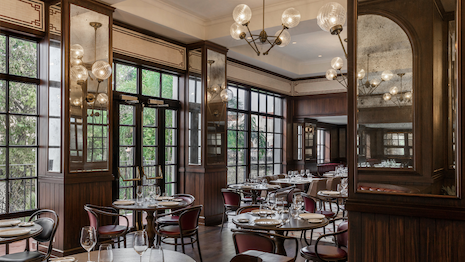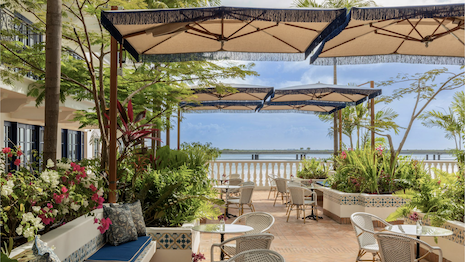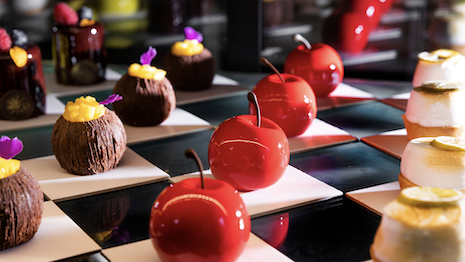Hospitality brand Sofitel Hotels & Resorts is bringing a French sense of “Art de Vivre” to sunny Panama City.
Sofitel Legend Casco Viejo is food-focused, reflecting the plentiful Panamanian culinary scene. The new opening is the first of the brand’s Legend properties to open in North or Central America.
"The French 'La Compagnie Universelle du Canal Interocéanique' began work on the Panama Canal in 1881," said Marisel Salazar, TV cook, food writer and recipe developer at Michelin Guide, New York City.
"It was under the direction of former President Theodore Roosevelt, as the canal was only finished after the French gave up," Ms. Salazar said. "Their influence is seen in Panama in small ways.
"Casco Viejo's colonial facades and aesthetic are influenced by the French, particularly with Plaza de Francia, a beautiful plaza that pays homage to the French role in the construction of the Panama Canal."
Panama palette
The many epicurean offerings of the hotel feature world-renowned chefs, boutique amenities, sweeping views and rich history.
Opened in January, it is situated in the Casca Viejo historic district of the city. The building, Club Union, has played a significant part in Panama City’s tourism for over 100 years, having hosted the likes of American aviator Charles Lindberg, Queen Elizabeth II and Albert Einstein throughout the 20th century.
This century, Club Union was used in the 2008 blockbuster Quantum of the Solace – the 22nd James Bond film.
Within this culturally-important building, Casco Viejo is presenting a culinary perspective of Panama City, introducing five dining venues and a secret speakeasy.
"Panamanian food combines Spanish, African and Indigenous influences in carimañolas, yuca, chocolate, tropical fruits like passionfruit and coconut, rondón Afro-Panamanian coconut milk seafood stew, ropa vieja, arroz de camarones and more," Ms. Salazar said.
"Since we are situated between two oceans, seafood is a huge part of our cuisine, in addition to 'fritura' and Caribbean influences," she said "Panamanian cuisine is also highly influenced by the United States, given our close political and historical relationships, as well as popular culture influences on Panama."
The exclusive and hidden bar at the hotel, Arcano, is tucked away behind a library shelf. Adventurous guests can enjoy Panamanian rums and their own terrace in this venue, unique to Casca Viejo.
Among the five more straightforward eateries is the hotel’s flagship restaurant, Caleta.
 The dualistic menu meets Panamanian nature, as patrons can watch lush groves of palms sway from their tables. Image courtesy of Sofitel
The dualistic menu meets Panamanian nature, as patrons can watch lush groves of palms sway from their tables. Image courtesy of Sofitel
Serving up succulent Meditteranean fare, Caleta is led by Michelin-starred chef Lorenzo Di Gravio. He uses fresh ingredients from the locale and traditional, wood-burning oven techniques.
“We chose Lorenzo because of his passion for excellence, which was evident given his experience and all of his accomplishments throughout his culinary career," said David Kianni, general manager at Casco Viejo, Panama City.
"Also, he excelled because of his passion for the local culture and flavors, even though his culinary experience was primarily in Europe," Mr. Kianni said. "After speaking with him on several occasions and meeting him for initial tastings, we witnessed his dedication to embracing local flavors while using his culinary techniques in creating the ultimate gastronomic experience for both Panamanian and international guests and visitors."
Guests can order both Açaí and European cheeses in the same sitting for breakfast at Caleta, and oysters with classically French sauces and Chilean sea bass for lunch in honor of both food traditions at play.
The seafood-centric menu as a whole compliments the hotel’s overall fusion of French and Panamanian living as it showcases the coast; the bioregion that these continents-apart countries have in common.
"Panama has a geographical position that offers a variety of excellent quality marine products," said Mr. Di Gravio, Panama City.
"It is very curious to see the difference, for example, between the textures of lobsters from the Pacific and the Atlantic," he said. "I cannot fail to mention the pineapple that is grown in La Chorrera, a unique fruit in the world for its sweetness.
"My cooking style began as [being] Mediterranean, but what I am doing with the help of the chefs is to include local products and flavors and calibrating them in a Mediterranean style to reach all kinds of palates."
Sofitel has been exploring French culture specifically in recent years, building a stronger sense of identity through heritage-focused campaigns such as “Live the French Way” in 2019 (see story). The brand has been bringing the lens to global offerings ever since, with this opening being only the latest example (see story).
At the Panama site, the rooftop bar, Ammi, gives travelers a clear view of the city skyline and the sparkling ocean surrounding it, as well as al-fresco dining options that include local cocktails, a South American ceviche bar and grilled classics such as octopus skewers and pizzettas. The space turns into a Latin dancefloor at night.
Hungry eaters can stop by Vera Café in the morning for baked goods and the country’s famous coffee, sourced from the highlands.
"The famous Panamanian coffees, particularly the world-renowned and award-winning geishas, are a source of pride amongst traditional and native Panamanian food," Ms. Salazar said.
MAYDA Lobby Bar & Plaza also hosts an afternoon tea and pastry session called Le Gouter, a signature of Casco Viejo.
 MAYDA illustrates the brand's overall push to explore the connection between French lifestyles and those of the regions hosting company properties. Image courtesy of Sofitel
MAYDA illustrates the brand's overall push to explore the connection between French lifestyles and those of the regions hosting company properties. Image courtesy of Sofitel
Split between the lobby and outdoor terrace, the brunch-to-dinner-hours menu is made up of French cocktails and shareable plates informed by both Medittereanan and Panamanian flavors.
"A world that is fascinating me in Panama is the discovery of tubers, such as cassava, otoe and sweet potato, which are very common products here in Central America and are ideal to accompany meats," Mr. Di Gravio said.
"Also, the different types and levels of spiciness that exist in this geographical area, such as aji chombo, trompito [and] aji criollo are very interesting to create different flavors and balances in the dishes."
Guests can expect mountains of fresh oysters, seafood arepas, ceviche and scallop tartare with plantain chips among other bites. Following sunset, these can be enjoyed while watching the daily Candle Ritual ceremony performed by local folk dancers – the tradition is true to the local culture, bringing guests an intimate look at the country they are visiting.
Locals first
While France and Panama are separated by the Atlantic, this hearty lineup of culinary establishments within Casco Viejo highlights the similar flavors and lifestyles of the nations.
As 58 percent of travelers are pushing for experiences that benefit local communities, hospitality brands that are deeply rooted in heritage will have to adapt by way of further integration of regional perspectives into their offerings (see story).
JW Marriott, part of Marriott International’s Bonvoy Hotel luxury portfolio, has been exploring this concept, recently opening the first safari experience from the brand (see story). The location places local cultures at the center of its appearance, operation, cuisine and values, rather than imposing a global vision.
{"ct":"0DxeH96FmhEJyExqFxGi1DqzoHoXUNl6CEPLhLhop8Lir05yZoV6ikVmW1w5IF8E8RvQDDsZHBwaimuKDaFq+dme\/\/OVLqh0A+KItSrX32cTB8xqBN1BacVrUMTpsS9Nj9UvpsZ7C2aRQPnfEzja8dGSjRTaqQXXGnBJvQckpAepS5txfhorMUKfveT41rFr8RuUXpfPG0mTx9PE0qCQB2H8r7xuxcXgOIpHWd8jlIEcADvCkMiDwP9MKa1Qa0Vtzs0yVmoAhnCTiI3dvz9AQnxY55JfE05OvxPsHpVBMRVRIfwiAWQeFxINoKsVx9SuCyfMprij8+dztuo8sqLf8NpQVCID2KX5QDjWMdjzXXfIxXX83qEQqJA1tZEpew5BwcnhLcckEP1Ipd8\/kXCDyXHjn5ven5N3oFqWDP4W8RbFjJ1PqVREPX7n6z1m2YHBWVcxa5y2OUaaFvcqlWOGFFrWkIhRa4nP0FMEedLdorQQBCjrglUev5xN4KC\/AigXy3NCAH0q8ZlwBvCtOdPe++zvucD9aoo12FFjR6PYebgj+2zp5WmVDCYUzdT5T93zD0RFrRFPDKSldsmhFRl8ALuW+h0hGtktscrco6mPuA0j275f2VtRfjAImhTtY+3TlmSVVS9gavjK26Ylp\/\/UIWo4MFTrtcK1es0nIjVlr4CRwlMJOT611OCvdGdsnHgHr3xLFgOBp0lZxqrIqRd8InAO3U4gda2hVO5t7wMU+Y9QQdEfppMZkjGhCvyeGgqC5QHxK3gxfw14LTgU13hH4w7qC7dvY2EDvZWL6Eou0eoRXK64PlbIpNsigzh3AKF0nmSy9CCbzdvRMzEVAusmK1Ayw3d5i5zYg8bRPlSPAIdf\/2XvQyWL60WRbWYW7\/CgVym+YskefcZ8ixqsDma5yLmxyu7w0bNHnS9P1B5nXL148Khg5C\/Qf0fcW6uZWdZ42HiWISPGWhv1GKH3jrapClO6MDu5KvPSAw+tBj9uIY1Elx70qMMDjAO5PIywO4BAn+Bmf3REUW86+pLU9uvDQiDmu95cmqpa5x2Ikrc64EAaZuc\/vEs2nM\/LdxqMDmRjggaNkz5fQN0QeiEdpA3g\/ZD+P4efeAuNGXgjeuD+cGLWVRDzqZuRL\/P8wLGFWtZKjyFbPXeDJkxIYIABJjPc+hOlYMTaxGSLLbYySrO1XX57Zr3jKMk647Tnt76U7JUqsrZW788E7hNgArj1j3yZreBB0bGTtz9aFPO3SMo5Q6jjbUe07CJf+xr0oJUaxSQYUEHdccn0679pOCQH8rKdeBGDPjjiYYue4BE5fDC8vyEdqPZ1we5ZcZg5lygHGmIuWX3vR\/nemwBTgWIuLX4DLfTWa0KOp0KQSUNuBuFJOumrHk9cTgSTx+Qn9F+xAkAKckbDOEnKhaRbYRmiEybgTslh0do0wZbn5OS8E85RSYsq+8yr+WgJg0AIW1f0y+redq\/xoL5xuw\/oacP\/wKNB++NtK36jUdIMLJ9lZKBbEnv7A8Lv5LvVz7FmL023DLYGXC7IhzbITa6A0\/HL0KrKwQEUcm0NQX\/b9sjH1RJbd1rkVhalOVE1kh14qd4xVPRsvIupr2cqSKHeOwkzg9fzIUJ1gZzBbgLzZ5+wYakA9hzlywnKTpMN9B5WXksd6ZLQxqTD2x4zQCOkmwkYKdXEZONb04Fk+k9dYynZs0s2A1yN8FGohK\/Gb3xiDzvrJNrdBCgbNLfXJTIIv7W9dAEwlqrgnmPT+qpEXaYUSwlibD0FdWUrj53Z9nvPR1BAnGDlLKdOSLyJ33L8ErljyOtaJgnKxOgoUnKOQQR4J7L6wiivIcTvH9bEv6CBstDhqQf9P+dlYFR77SUuJKQ7go7Iv3lVzXOKoFy5br12PF8qdwUB0KFDQevrB5G2J7wXmnEA1bJwN+BEIzFBsN0tchK8YgV4DIEmueEzEx34zb2HdxewTUiBgwPDJmzPfy05zbSaciaQtiCB7CaOoR+oJf2g4HfG7jVeYHq+t0byL0aTIKyWFU5ipE9buwtt2p0KJxb31VO+ooZpBFF0vD\/jrkQjTtwOlN+Um+rxhG+9eS03Mxkc7R0ZTaSE2r7xV1V+UFDnYwuv8kb3eo9\/wNEbQugOyr+gN4UtDGuV7PhGgysQBjSrdYEMi+68mlwIg3Kie\/3TPUhVLKImy0CalUeF7fLqu9eEUEQyv2dY1KKkAOIXzlk0ig63JkifNmqGRpr9+oGXdX+mz1ojRr4g8e5BqlfzWqkLNYGbcl\/Sd6umuazAv8+eWPAoL632cZwSnkYimgP8mhosEosf5QVTmqrpd0Gm3K9NqUsjURqJ3jrZJ2y9Xz6OnAT7EiU7wWl5LxaJevk3IYDH6v\/fwK4tHvkjpM4jhyjQ8SRScZVvziTUjAQmkGVmsj+BePvVPSAFOcW66I9+62WcRxzO9uaDb4+F415EOzW3m85rZixxkiYkxHRWW470aLmqVLvnIHGZHOxwyy7lsKNhH2pvWIiiZlYwYFCRue7oyn\/WGDeZOn86ZUFlHRMAnjSOjfYXJBbF7Hjs5qq9OeesSXJUtA27DU1RgL1M2Qpu3oL0+ODAtX+6u+5zHdFUTe8LqaztiUI+WZLnqRC2I\/9+ZLl4kTc6vT\/WSkePDewqbZ\/XxTaJ9SzxMbXi7YKwG+VKsGZw5dK37EVM7gLtwcLAxk+6y5ZbBuF7OFcHHO4kym+4ke5kpCFb8JgxNunlaTV7rWshUKtpScwU\/8Lxgx5yija\/0y9Kcrx1Hi9z7JzzWE5ofK3jzyPMcaB12H9ANygnp7eHFrqV\/d\/CXkiH0H\/BvcYv88MyL9ThG6BQbbob0boET9ja49kvKRfnd1CrTMs7lGijhfJEhnB5Rl6Yp3wFAFL3VmerKdomnsSzwaDIv7hFPaE5MLvOo89aAHznDgUKoDCqaGka4Jq3pYUopqP1nM18a3Q\/SNIDJ4EIwBdLMNKRtjGuVBKvs5SaKP1Le1Lye87lTVg+WZj58S6B1wd84QJVmUqacuHxTknD8YM\/ttisYbLkUn63M4P1eW5kKHnrcyeO6dRMwHYOqHlBkfV1gfQn2N6PQBQsIGClzjcIRPPTp7yFPfKffplmO5\/Luo5W\/fzi3A5YybYc7Gfk5\/6OSrwTTZgRSCFgD1Wj9He2FeT8ENMFMCzl\/3QgZVAjfuLvtk3tAqJP2Wd2K22aMogaHMxI2SxZxeiz8BxLt21Iob7w\/hDAnLUInNXD0UVWJY1gY8fGQMrRc34S9MzFgLtCaIIXhh8oKmGNOUtkiM8JyNHu2PdlHbiHGQrk2N+NGpW06E+\/km2AnnGJSsC9G3NHD6ZlYkkGFPoz3XGDg4fYo6mEK5e4igaQoMsIMCJ5UeJKTCYUg1GXyMuSQRKNVT0WMONXvzyKvbuzDeP9IqgHZZ\/gLvntsBTo1bEBWhO3jc\/FAX79jO08\/RYaGEL7A4C\/I91t13socW8+YUUv2kgowzLr63EbP9VMrlfhxiqlrSjOcY5F3IUaQyAWhCxUazLPlcNJI8Y\/Z8VBf3\/CYF\/inwo0c7abU\/llsaVa7T30CR7RCDtaOKLGgY\/txY\/ij+HCU7cRAm+Hn3CFMv3YMDbYfb0aXVVN8i8nLCfilIpPAgA193W8AjovgHuBwMttpvAro4IJSLRtWS\/3QrqGSoRfc1nmyVsxobz2c5eVjxgkFRUcED3xrhmqgqRZzRUETdbNx8VH\/GfLd4G25vaOwVBt+BOoW9uGGEudAOUc3cFdSlw1pLb0Zf7s8MkfUS6SpGn\/cU14QOi5\/fsOIzour6X+HiQw4GpRaBLb2KZK2stWBLXrF09vQlUhtY071Nh0rSBC57BXoX8R25ttPszRcfLF+48VKgd5AU5oATSbvntsSkxmexm8aRjy7HAqqdcGhzUhq8bGE1Q1FxkdseS8OH9CMoRH3PieG19pWMUEgAyQDir5z5J29uBnXJJYivsPXohuKmybHaDRaEYIwLsnbxmDgPF1T3js2JL0IBgezJgSjUY6fVlo\/+LFtgQCHVP\/FlHlU4thuQwOzOSLvZxnRrna+ISZkkbPwUBZHVAos3qPMFcj75V5MicZZRwjIwn+0dExlecaR+TP5sC4BYO\/R5IKFWlVZHMwcv769W8\/luqurs8yfiYCvDns7X5g3LfcwQmpvFbzZO2X1UaHYD2Bj+G3SkMUk5qf+1eWJGYdaPh36g8Bgg82H0CQvqe0LIOut1niJ00YGdZBOWmm+aeXEHMq72pvqE8Ah8pz5kU6jwoaAKCdJTu8YX3QlgLpfmExlhg8OfQ6BDmV1ipyrwTuCMtGyWhNuxOxAn\/eH4J9392TTyXnUNmXKZcyMyLYZnjngaHaFOHQYw1mmkMpUK6C02UlMXIQ59SBnUiH6r19ueRJ1Mcczcfh\/w\/WJe3oiGKOkxXD1Nmm4zm2Yk9TGQSiOSFxXQJRE16LPPvU2QGBUcXTF19pe7HdpW4q5mTC+x5Hvv6FwWgvXluzAmAYCZhHheLmJk2ry1YOKnYRGZKT\/qZTAVe1\/UYCSR\/3UwwJlTGn0sxfgsPJdhUtl2t7qlSa4yG\/4uj2Y4pzue1GTktosE++IYhNvk5vsNoTK5GhTB5JWDYvOKFjglgYmC85Ai10bcqzSa1R783aQOebTmkLAWCmRcbUFp9FJcMnt76Ef0ad59XFN8CywLHRsH+EVu9hDp9e0Ofmbz6uj\/0+54JdPKE2VJSqos7j9VonbNnChLf7b3ltdOWDNn0fH3A0QA7EOV\/vhp1JqqHx5RfNRgYxaSev\/oHfgGtICcxA7+CUGCMnBjCPW\/6fErAaI\/2QnlltxtAx7Ksn7IESaAp+PtVqKA6\/TV2lGN6f7zwsYp4lWmbT6BqP0\/C8JaZbr8\/jbFGgegIU\/cl4OydMfnAbsufITyDyWW4XziyJ31eVM4ncGX705PLQMoK+x+lrrAN8C3vBZGcSdq\/zTUYqEZazkgSO5kkIpLui75RkgCJBEl5MOdQomnjnz28tAAGaXjr25GJU+fA96HpCzlc04BZi\/lVZPzgUJN6jP5BPoyfn7GT7FOf3H4K89c+3wSq4t\/z080YeGXsxC8BaXWXKOKQjt2mTYPwoW67lEVZlpr0sc4T5XZ4bREp0iqgYEnXze\/65TtHtao7j6rLF\/CxrJvhFlqnSqCQegFozoQ7WlO1ozQuXy71dgDgkTNFn7zEGhlDxxdpUeke7zEVEdDpTwJybiL5ij52y\/QkBfL3gyCiVi8HkST5fRwqxfbZIwhNF9KgIYS7oQwj4HBBFD2Bujnl34PW0a6IPE1FEsoOOMZJJl0OntkPEnqnZxVAqS1hvpeLJebRFHOx0yD4xKCMpcwlNnXl81q15MQbr5wTZ\/mnY3TFFFZsLwf9SVvppeZCqX8pJTkmmJExS5961gecUANFKqcKXEXX93zHbRjnaubkYALtQJbxtvd1S8HwkuXU3Jek\/7yxNG9lIYDV0+Kjpe32AKihMcqpX2qf+BoHmJgVbKvpKl5zPELZqNM\/dU4PDtLKMf8ART5iLmA1xMxG0rEcd74LNA8Xc0bMEiaNeh8IWnINyN\/mqJAfRl+F0cRZu9yl8Mx1cCYEHa5WL+SWR2O1hxtOcrifHCsEXY235VBXa9zr6ev61ppMUZZndS0erQZmo9rTazHNnjMK2lUAG24N5i\/2jyeEk\/UpZvqiP\/Ytres7JOggdtUYCcZMSCh1VSDdzoiZmpXm0Tu3Ixi0lvWh+VJkeh8T2DfI1IXdTa\/tuYs6mlcdJh994at0AEjyQgpudm4Adeg1uon1\/EKASu1czcToLHaG3E4SWdgLTClArA9fYBVNfNTtOFDqkBwA55HNyuKxtVQZtg0lLxyBFxLTnoMMWs0rCMu155qdNy3G4K2R8VcTrbmSfv\/ypYnt+eRlIyaQWEBc\/5VQSlh2X1nwx+xOxR8H2JVM+IWajndE+nmv1cARA84FHZ7BJQkvZBUE\/vNurVlE\/54RIoyj\/U6i\/iMCDqcQFQ8qY+Qg1iZj4zj+B5DQkAiuwmm3JTNu\/s3xfdJSg0nnFUtmxmPxw77OKjtTTFYsAjFTL\/g\/bpRW7ywwWXTSlu0ms3KteMi\/WKr\/IP8yK1NI+UveSQ8kY2rIA6n9bP\/2LBwVNGv51RZZPO8FZX83+It\/3h5tOZcIJlbpt6cvpMTIDWqkF6x4YGGUjZkxsm6FnyR6zooie48DlZTS+t8qdtIWqG7obuoPPU3oGb1rf+UMmDrOrLJ6YGORzAn0BPj195mC3lTs6EYn339Q8+yT1WYnzMq44QpIdKhMsQxFwo88tJxCbs6zPBq7H0x6LVHou6v5EFEyfJcyEZ9XmUFefEIeWaifTOWbv2kFfuQmW5KkUhE5frmP7ZfHI1hnlAuMBOBQkB2GTpzgyrycRQwFhF8Al7r0BRiJOA\/pbZEJtGlNWDf9xXoQLL0zcdoL5QpD5o3eXufenp7\/xgbPb7HlllcvWGwSZihfGi0Bn5Qv7x99RNlDIE8RsP1AUtqQ5RhQms4R\/DSBaS9NCDtK3TiEh81sd5\/L6GD6AWD1JvIv7e1KDvQKALD1qDZbNh3pavGkGrBSCTOHYNJbZZY7g7FE0eytBXYK0w9oTZp0NxPyds7JVcpgdzj598lv8OZ+owz0lSYIVt4yn7+J8qbvzWTOZXxvRUtnWMZSPTKODb0QBFFm9lvG\/tx0FO1XQ9wq52QGNYnGyVI14mv1F7ogNCpb+Ll7wQJORrF1seRZjF0EwBBYYpTtDsNORaS2+X9YcBp0EJduC3XErc8Vxt\/CLQlTOEw5TYd1A+MYr8DF4XrxHe94DG+Md\/eVMypCHN8T4u7iRbSJjgVWhTT2kjbPFCCqypCuUydpCOskwT8qe9ZquSr5h\/AxOBklU2qh4D2y30+89Mjy8jxeOrlfD8rIMbwSb8+ZtmP6CezIs3YWcH15S6jYEJHTmXyun8jR5ezGmYGymnRz1hmaLQpFvPyFQwqUTdzPhJ5cNdaiGk0g6fyxmBRkXR3Ajok+jO\/fQApoU+fcVmM5j9ezkUOJqSlpToVjklj2aZ8FHnt5NYEqV4ApXM6m2odvsKhG6Y1naKTm6\/YrzeWxzZNuaMPvhBUmBMNnhQBNM+5sPG1nST2\/F6bTf+B7m7Iv\/Ax8ExZokiEki69Rp4\/LNiaZHHNl9pRWMr3f5Ee8JNSC6tP6i7UvQJwPLj\/ksbZNZpquIDSw7x+LYEDfbH2hjMkoDMUjDWQlSWtHOIVZChsXuOxVtzLzl0rCYSS+M3fIfP76dxOV+scfszOZJfdoUk0j1z5dUPU9ld5qRGNehrNMjOAvmj5LLUAbfY1RzbTqVSK+p8JhjWXkvmK4sD5A\/M144GJOS1lcoTe\/6n45ZDcgJihUsF8o0XbJzdt2zk9K3Y\/DdLdERizoi52UfM3Udto\/EXPukDwBIvnaVXzL7Tjny2x0rlo7MaiVHaXCbS8xBqb51D1DrYVhDoQ9T7r2LCIij9rvjrx2WQfbI58V+Y4VxO8ufPnPJDr9y6kcqFgT8X3gPim1nTinY\/LypyEDKvUouwuJ9TI5yOHvdE8Cwhir+3pRWJO6aG0LLlVJYXecBm7Qi19BsPYBJiATJv++8AbFVTz2hxhusrynRbQObbBRFJVWTHwP5gA1Vxwu44uyhkAtMj6nERIoPPY7KDV4S9V6nBqcZQRBCdb26JNty3yp43w9Eu7vQ6fO4WxmxzOYYotxyak97shMwafw\/r1FxnVmESVYVQ3AkLsvYKSxYS9V\/5uYRqzkcidA30ZRcWwu3GMMMV34Cgmqwx2SdngmEUx3GIPl2lwejAtz+7taIOzO+rx1Kl1w1zPpwWc5\/Q7QH7oZJbaTaLMUw7JJ8FocbghJCI9pU68oCFBJHigTZYbB6WSxs3YlgCBNI2K\/Rexxo8Ym6Z1nlMKLOZmfRhvsJOECowpVi80f7uGaMDIYHjAXubrHooDfp0nAl9JrCo0uEYXL80eFzXqBkefbjJeIH0NXEl+lGnuA+FixGMf4eDie0VYDq7wZy10scQUtrYJA8USDyfdEHZXGeGwjsrvHJabznP0TMtIWpOmXy7NTlu1tlXIjQn7myzcWywKuriaMpO0QGcgaw5Ht3Ck1bqcewrCJ4DJyk7Y3FSZrqItpHQL7GCamWQ\/lbfdi4auvr9M4uxxkLbkNFKpSm+ing9fijeAqy\/fsotmHzESKyo8fmI7Rc\/NfHhZvX\/4OW48rfTcfyWHhHh+tQmnq65c9XKK7ZyJ1sIYi\/xqfAx2kUT0Y0N2yhSUB+N\/8FM6m2jo4wZhQAnOyVtD0TeElnmFF22ZNbcsjpPZzD9KQDPTV\/VFARa\/LbpBOWOhRUHTbpivquabXpxHuSwq3oIiDpUfhpwEcCDpatwCslGVvnKhBYpK\/YUFAt9EiD\/TGZ\/H5nKzznLMfNOyoxTbHg9Z2k8D541nj2Bwzxe0ZRst9yQV8VvvP3h1gGRTXlBQxnV0zS71FZhQhbZ1tgRtdUPk+o0NkHbVtelEyQrQTIGuGJVDRQR+Gf8dqRnshEeGCL5w2OyCmjpuKlw54CqwqIxCWQevIf+w85B0WdYR2tDdVo10RD+7h61sbUmVEwiDCjNEcSp9bp1\/WwvLEMat799xqxHVPD86H0qLwlMepHQ2iqZAtkoME+A0yxquTs3z8Z3b6K2Ox6anA3fTHDQ74WJJ5fv1r26m6e2J1ZQDw3gAjZ1xfEZW1RV5vJt97n\/2SH9Brj4uQNyPbxXuugI7RAON9nnwPp8faaY7VsUMjzHIRt2SyGIVc0tQJcgbo\/lasAuEL1X\/lo4mJ2c78b\/OaJGJo4P03WkBbd2ylMhcOc9EjtFJtk7nRLQfqVK0Z36rvdCTV9F6Gsojigf3eykToj2e9OYn0w5ant75ZYQdJb4tx9YBnM7O0OcAz8sX\/JhnRw4l5RKR4u4pTecUJsifbg635gfXwcPytN\/jdKVmMNE\/WrOGvGEcG5sJwwAGyVyikh2V94\/uJCOcQDqHsp58vjX0yJUB2nlTLI9D078HH5de3\/ntAFco5mmoTyszh4\/\/hvS1BjTG5HWUemoyyJnHvIgx+yhc\/WFIsgbEx1bPJlMf\/szO8olpQHs9X8ONW+0wP6VVZ7OfNLCzbhaaLZrc6T+bfRWdXM6l5kU0ZT8nvMGDOQ0hER6nJSorkBa4agkdItNUJ6qfvkSDdZUyPD5jAaWa4\/57MKuVCZ+wt88ckkAW0rfgo0uFHflSseXsd+whnq+gz0loTBuiMPjZsG+EJSiPLXAWKgYwQY0pdmmvcUHnPKeJi8Pk\/BwHpCed7V+dDKzxrKlqTrl1fMUhTsoqtDYsFLb5ICAdd5SQM63iKKTTLiEjUi2WBCNk98+6dMCKVYxKqAW3hAxDTP2USbHlj9H9OpXI6Jcu\/AF7CH5ET53EyILWioRq6\/x5LPPSHBXOhBTchnDu6frWOzLZCkgCvtyMrwl59nr5QQp1HbvY\/CxqyZTzTwj4AAcTDijWoX8het2LGQCp2ZYkou\/X4XU\/nVSeuTrO0URxx+n65IH14drMVWKL3wLd75a88fyBHIgLkJAgjwxMJW7ldHbEZHBOp9LONtF\/dUiPZ5F+630\/ZFZAUUsQ2AmioxzsLYoVa9r5NbbcNdrWUj4guBgA8iDvBXVmapf3Zto262sMhYTo209BYocq7ycLLDBdozf4+purzMM9xn6qlxgKuoVXWTj7buMYRPXL8a\/L6FMCZufrFl\/HlHQY6foAMOPPgAji9wCxHfzecDemFe1ixouBXiEmiOjYI3xxTgMVZVQEqNDrc1RP\/Bg5yd+3EIpocT+Ra4LrK9q0CzrIWIRqtXzJdGx2mEmSIX98YkQWQZFsnwaKnv+rG8FGm7OI3CM1nZLsH+n9+CToLmDJu19mIpj5AbZKsYDcn24GxRkWUR8YzRmArSFZWetEB4SHVuU3dsflzAavghVZGx0tmOlFjMsbEIWvC18rZd7Vft\/vqeQq+6Pj5i8sJtZJqjXmGhBKSkcGPIi22aNcX9sIkb+QyeSYlUauW6JFoJjq01Gbhh0yfPL7DUefNpcq9IAOn5ZMcME8YbQ9dLpN+F3LpjpDtuAiuYusuUveD2SV\/9NTbyxuoz82AhnGMO0iJSdi+o73Y1ehFl3ejfSDjNemy\/vnWhBmb\/wM\/TxxEAXZdNpH090Oqfb5uCIExKztJUD36Lhl70YVFzQlem76Aa18RGGYjZ2jEBRLmkoHCmXWCe\/fMLDcxKx60y8hqLyal5ld\/vsx9SYUvmcnslpc+nym5p93QBmQ9PXf0WQMOiihVbPu7UI\/cvMRhodOhN52JtFjPnrU7h9ucRoxsPj5EZwcDevxcKgahtan7f+qesM7NxQtpGv87glYzRYMXLL4Yp4bHmQtY2eLZ7HRqX3Q6WGOuR29r\/DWxLBMfzKkHk4d0RrAYZy52PmXEyEraYks0LdNv7QDFYGTfiM+cUuJwGV+MLsedRwjaBZk+sAJkD2G\/sbFRoCZLKr8rRc5nPjYSQ2AkyAVkVXf7a\/svX\/Qb81JLOB9BWBG\/qmEsdjJ5kwiy8mKq3wctPfgpjXHIlKNQIe9a2S3V\/156QTmOCDHsr8DH1rDzK+TToqLYYU2teM4MeQNVw5EffbnPJGsHZIxOa5Lc1QjTPi6sy\/oaqeLUpwSlaEbDssS9TjCaj4tG5ttrjRVQaJXe1HTv7kuKR9KMeiytXPGppsOKU1FGgbLux+YI1nB8skcq1OSMZY0RvRTxcQL9eRzzKVAk9b5vt2CvTbrRSLEguClDWYAH0zFF7JIpoZ53677dEuGX7XLMYeGWB5ABXu4kM23FNODTyeszg\/yU1+TIZzn06xCPX3K7i5oPUjvvuWgreFcsNCM15Bd6GNrdgLfzuN+InlvvxqwL6D4v2M9\/dgSj8Nuwug6q9\/iZe7NwkYO73l8CEvHUVSvaAxjSTGZscsc\/Tl1H8g+Ju+ykviIxp3oGcERQkEL6e0qgta2ay3yw+rzUG8HsWsf44ocfKxFMFvYCnzkoTetRPz++DmPidX3OYowkbQ769jSJ+ep7vfPmKSwAwtczv7U5\/QbjkcczlHkUnAlFrSvLfzF24WLBQhe7fVXuSKCJK4S5lYI524yxhN8BKpkuWlXz0ip0mrThWk+0xw11Un9M+yrt01Un4W4fsFcB0BjRsy6Aykr+MhLh4DCA9Bw939sNwZvhYUJOcTuWfWvFihvxXYnhBjMMC9JwH\/GV2NWmvBh+NVv2dbrRWLldeFMm5bIBdP7xDt3KbQ4HyywMQHBGEpBdfQTusPiaUU2rxw4oGkourkcMvXP2BqMdHDrmJ4ciWeN6CXhcbR9ejOoeJZvFS9LyrTRxfVUddZVYN5zPBjdsLPkLgLlqDyYwwk\/I0M5FWVQV+Kk5AqvX2Toz7Q0GW8kKfpZxNDbkKFFz9Js46WbkhOXiUoqI0or6fQQncR841yoVVd6sMIsqlRng9WLnoRkh04ihdbBlne\/i5DMF50NIY7ktQcnMszhGLcHIvGAtdbXzI\/T9FyjYEUaEuJN2hyCo4axF1WQE7DxvmX4chwVNMzG4M3kKeIwZthw62vrFZoJz3qFeOyaOHT88CDXHjXaMQ2hZ1USvJgmZ8KwQzkjMfAdNI1fzX15mpOciFSKpeJTkUp6XEM8rJ+jq4XLILw2G2vIfdgjIAJ2ChhPyWu4e6EGcnnTJEfrQY0kjXZyv+y8miTvh2r44KO2KD\/uhRD4aZ04s8qp7U0L8EkjBcz2dWnJdaWQgpBDAv5wGfgoKeeUM+72ms2iJAu+EmutGKB+b196XJWyoAIKrUSthERYwHW\/FiwyWaJbe6K2G7s6tWRdsccn+0j\/w1jxDZRb24o\/HVtG+ZPxJi+VUHxRLW50BfAc1AQpDjMP+0GjlzqeVtKR8Kc6s5AvnU4TxugpIQ7fdJaLae9R6ZaN62kz5oEgIB3qDGInofFEDdzBCpzCXdMTWGZbam0EJ2\/HxDD6dnF2jXbXPdmLZOEg1Yfp+BCzPXgTq09\/FK12bDzqXS5w07JuMTncqR3TbUyLJ\/w1nnufI+5woxVcXneI3Bnd+I4NjwmrQKXyBH4KUsuYN5Z9+QYcEe3dnJV4vcG6Ch+crdH5swo+8lP9SMx0r7FppZAjPYjYTkVQLYio53ZI17Os35w23Qlkynvkivj3SJX3pnv7Wk1RruShYXS6g3Fz00pkexmEvPDZiZ2Ag5aY3JPr63eS4qPuDfjGFJ4htM3YjOB6U5c85FNrHMtJZylp9LuOkE1g7+iHfJtVyccuupEYjzIenPlMgCAaJikjy3nk3vGYakbZdV9bf2GlsSmW4IF5c6cwe48BXSWoqdbo0ps4mJduDFhbO9dT4\/p9Z3m3fzosx1VqrSGGEDgr27sNIIW2x9C6\/91NNOwCkGXpVv0\/i8w3Ywto5raekMvzyllndEBxRPDHDo\/g3nHKZRPZVPVs6dgTWG\/xk2yUl3clMmJ\/YE3fvtI5+JDSS0NnFMIl+\/5j4kMha8A6wwO8Ksx4fI+XZzpXRDmrHmuQ4CrQwW5ZZGGPtSwGslxmGc58vMhHDjaK2LhaDPQeNk3RFSPcnbm6VfglFXjAzBC0lTZ66koEc\/G6cjeMS5yRSSHQLaGMuhlgsn\/AiDDk1imuYTmUP11dFfDI8jCGEk8lPbvNQUOs0ZUYakMRrppQSxOSPPEeNj4+tkbw2LP1NeNHrzQ1w0L9zkpxkMMY8qDttTvaqBZeQpkf4zYU1aVIau0SBlFm7yZBnqVCS2H0RZYY5v2nf8MF9tVUTPJV+vMyfox36ToSKR8E3Y6ZfCnElTNVN4ydzn1qpdaL1b4djyGdWmaIAOYnGLBcLET0VJkp1rJddpw+TDpP0CGcX+k9SUtZ1Uo\/oBUPh9K7wp+Df5CkQ+DFcAjl7l5bW+VCKfQBNDy6mR0MQdgtTT8rbbIkHMdvxUDP9ynedwlb+PMMj\/VaA5GrIrpsGT8j\/v9ejIyR7X\/4PIDgjNKKkn+filKDPg8uXCYFCiZTESHJkDevM4W68O2J5qeWMAFB2yMjvZ4nWpqc4JijVRT5h4x5y71vu8mIto9AG8gJS8Z+mQcOwlqHbmsYiox4CeQfiO6dJzj0zawTx\/FGDztBRt+9uRNyQtQS68EE\/sUYAfLmRamyLu88VNFcPRLgOu\/2LxA\/nNqS9xp564GAKz9xNOvH64J83QaYNej5KwQMjb3PNA47T2KTBYlFlIjQWqEO5xPOhL6HwgybyT705JVPe0MSvIFTIAsPoIl37YatSpbh+hE\/NRxIMv2ZacAoH+Fr5OamotYkhLO3eRFgJXlLJNXBHmIE2q32aNrQo2l4RyaOOab1lleaIs1PrdajVNN4H0prO11pEy6HAYXLZ\/zoYklTFKIHbpHD6ZkA\/tUIB6PLYD\/uxOaEnnRm37ZS7ZWoKrJDup05zDGVkr3+V392iSrmKJm9aSts2ubO6k+dXTTgLxBRsTx817L2EilW\/qSLl\/V67mjmQvESksJcvx3vPZQUIctdadILqEczKLmDg7vHhS23J\/sQf6peFQ61+tFFCnwaSz+V8+jMm4GwYQ\/pc6PZqVP+8xR5BS13ba2vMnlWOE0InY5S\/eYd0zxo2r5XIeXbpENR9lAaWqOdg6TAF3fU+4U7EPdmZDbabqMdGxd5Tc19HBG2vyQkGcWrhAtRz1HXQVXwJMaDrepyAxNK8q85kL5+6hOkcEhv5bdeVGofWd8Q7fe02APT74pGs15wmQT+KsQUZu6KUWNZ18VAy39wxslK7YzOY3n\/248oKM2Hx2giSDYfT\/UKoq18+nwdpT1QvibloajAKjABPpSdbkHjMa6xtMUzlISMjJ0ylZp7S6OAEWIPU0uG6hKfFbXwMUiywVGBoR96xoGmRXfJ+k8HWlwFezeFZE4hojJWq2U5HNVSrOfPfpBix2C7dwcaG5vc0b0pELBBdAVFtPrCSkUL1l48s4Xvrymxaf9LkOEblYO5F1tbQr8UJpbm29Lb4g3ZmvQ66G2tnSvYfN8iOBTG7hHQdRtzFTttPvEzahIfd6f8F8ooxevAcoxio+\/TwqBmt0jwqrKzN9KPmhb5rjBBkcpBWKKGNQGQJzrO4zVUGBG+0erNnt6TdeIhip2h4A1g6z3LuP6wdvc5jkBLW8Fxpm+9ivrjltVcPIjo8C4PqwH2AU5j9J8Qm9IyNp6xC\/kHFEJQbXZQ\/DYC8fYMdN\/Rv3qbkQ8NHTexWrwR+X8\/AIPOg1Tq57LVW7Rq10G2geTDnWABMyi8pQVV1NiodPdJ1HTvGu0ksBEk\/agQbjTSkU27Cc1NyIXf28qjw1osIrCRM3qptXcQfY2Gk\/DejdoVRT8pqDSao5fKgSaD36YHbUNX2yQ0AW5Qzy3Cf2IhodBGGrNRR2IX64xvr4pv1SGhif8afGkyBHZAsm3WiFrJDjbwiWspLw2fWtPLPA\/32qo0LmK0bgRA+2vWRs6zz6dZhHZAI2aJVzYUnGTOYF6ZTIXVf9Oj1qomw4MM+\/\/mDW9N6I0Br3qxVOT6I8hLCSPBwjzLwSp+CBKYIv3NxpFQBBzCViQ3XLlbr2vh3Tc28aHWwScPAIKYaHV8A7lpj5b4k0zqUsfMmHiVrvbnatEz53eJKkhQBP+ZKgsuGLh3kQjZdXqQJy6OolmKNXNEdqyBj9MA9pgmbdOGILTN4MQwbEuPaintEKB\/MrH1ginvsonSOlDK89CsyYSJnzcX5oOpg17urY\/JpfoFvt8h+BtUSd88BCMH3FeLvJO5mCOi5J2I+txizE9TrpcKzaZgsJreLY3g4RukNmt4dNIqnZJBjwY4hbFHp2lyOqEHzlynA\/y\/u0Dlq1eDToGbcklZeVq3VkVWX3KrnDDsoPV3WGP8K6uhTUake9HyphzsDxkGCz+sidbCAieJZ7gXOsWRUg7ayIHChFRzeyhTOu448aVZXARnYdvkF37keNlYcj84LLCTqyT\/Fui8FSW66nrp55nx4827pO6pBKSMZWgiV8+\/JwxsQVSNXDEf4255v\/I5JSBf8ylpoQPs8gpNtmhmKOuveY8rZwp2ScIk5ghE3v6qGuQ4jisomcW7eoRWnX9KDC+rSBCUdzR+wvw9ayVthEegwkPp6N+bv2mCcPQZ\/iQjzO646W33I\/2VGwghl3W2d01cEKwLNKGSjt7yG+6X206MYIvU6Rl1m4TIzSW7pdTMOupEfJh4qVzcEzk0FQ0JlfHo\/bbVW4PNd46+V\/5q6h1W1xtNY62wkbuz4w0rJcklq\/miQtFK3QPJYM82U31+CXG64BmjJz6AqkglIWEf6eTe6g17fL\/UlSIix2Ibw\/IJb0jyeIP3vmHoqKFamnGh2qvm+pQe7PCbSgZaPqdnxQOYf0XIEs3n22bF\/UxEfs9rGpm\/pIyG9Is0iENC\/YhTmdVe2e0+uPXNjsTvonhDrGwn2oSQXoljs+Yg6BWl2lJUw0NhRM83poTRZMJLX9c5GY2MUEuM9RnBCR1LRRgSxwZCfR\/5g19ofiC9GPaeJMRFpK+iFeTore6ncNdIq3YZz2iiZ0n91LNTU4MjifEqj1o4YY+E93xbMna5ODYk488wUyEG9k\/B8VpLnvfttO+MmOOUfTPgaoJSWXdAHyy89E9HyKZZcJtx3Bj478FZOJawGtwe3l2ppCmfvW0T9edkDRvDMfC\/6hypNK1EQ\/hSHOqwO7E34L+JV6PVhGiFbFAYpYIz0TIiRAVMkk1WbZpzhyGMCDUw0uWtoGZ6llFigqmxgH9+J\/FKySoklv0I3VR7oIGv0hrFIVAV8uT59daNiUomLtnSfwlIPbF9XzJF4Eo\/fBngbcPxyvjsE7Fd5k9MSpF5iURmj5WNVGYsvgV1kbAqAnJCsOzouIqlhbEtsv30ixC8gPZYsuMgIbwEYeKFsP4oCtf2FLAG2ddQI0ddeFN8Nyo1OEuAkNeEhsi9CICkB6jbSe6L0oHhZnl+kR69R61T7FHTEF0MnhX\/2a\/cXRzBG2p5qpND6l6lcheayBroLpRhRTrt3gciwmxkow1Rq9Kv4sL1HnG6FJx9bIsGO5HyISau9nGhbBMZk+ZXsKx2JuaUMNp\/0VJTm4dEzWR6f+L1TJ8yqOSA1l0KbnwaQOleqxLMHmKQKJslRRwqlPV2vZ6vKFLVDAlokdWccQqTFUuGgHtLs\/HGf66Iko0ZzU6sB3dxZwK3S9Nnpu2kZh23kKC3zYsd1cQH3QAaMExW6hbtlXhPJ+GO7Qs+YFR5pSaic1HsJ6r+8qZSdvAF2KBh0n+mhcNMWyrc1aGVXgb1P+M50q43Opsx5+bcDe\/7qUuIyGb7xIHSGZ09Xsek2ilGKRTcNiL8c+zMaB2R2N1HTvkXW3UfwkPWiEDFFO\/LdfUylNrUtkEjytYZbld5CJLonURyaRxxXQmGKc2XqcSADGxqi3JyjANW0I6nsWDwGPMI9N1eKqf\/TT+NGGbeGp4RBIvP2\/DHKcXy5oBGQvHy6fizvwJl1di3yt60b0JQ\/X7AJyTOve3WTb1fiQK1auifV5noYiUaXwpMSf5Mi4WNnJWX4W03d65ZGhObTznlTPwqK0BHczBOm3iGdtHkNO5QmmzJNyiuwXh+IRCzpBaqH40UgWB\/knm138OIqpgdVqZYCOjyNYIJDzdBn\/CR\/Hr7ia7WYny\/k4RaWKPOxP6h149Eq0z7rIReN9dAcNVxwrcdu4cg80dEDShFA=","iv":"02b9407db50211be9732c1beb318e16f","s":"800eb4d9bf7d1321"}

 The ingredients of the Mediterranean and Central America sit at the heart of the establishment. Image courtesy of Sofitel
The ingredients of the Mediterranean and Central America sit at the heart of the establishment. Image courtesy of Sofitel  The dualistic menu meets Panamanian nature, as patrons can watch lush groves of palms sway from their tables. Image courtesy of Sofitel
The dualistic menu meets Panamanian nature, as patrons can watch lush groves of palms sway from their tables. Image courtesy of Sofitel MAYDA illustrates the brand's overall push to explore the connection between French lifestyles and those of the regions hosting company properties. Image courtesy of Sofitel
MAYDA illustrates the brand's overall push to explore the connection between French lifestyles and those of the regions hosting company properties. Image courtesy of Sofitel